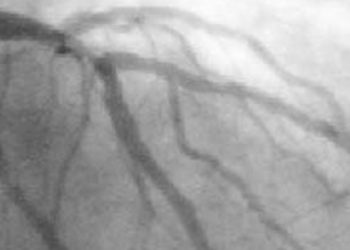Asundexian inferior to apixaban as anticoagulation therapy for atrial fibrillation
1. In this randomized controlled trial, among patients with atrial fibrillation requiring anticoagulation therapy, asundexian resulted in a high risk of stroke or systemic embolism compared to apixaban.
2. Although there was lower bleeding risk with asundexian, the study was stopped prematurely for lack of efficacy.
Evidence Rating Level: 1 (Excellent)
Study Rundown: Atrial fibrillation is a common cardiac arrhythmia, which can cause thromboembolic events and result in high risks of disability and death. Anticoagulation is indicated to prevent thromboembolism and direct-acting oral anticoagulants (DOACs) are the preferred agents with established safety and efficacy. Nevertheless, DOACs are also associated with an increased risk of bleeding, limiting their use in certain patients. Asundexian, an oral-activated factor XI inhibitor, is associated with lower bleeding risk than apixaban but its efficacy remains unclear. This trial compared asundexian against apixaban in patients with atrial fibrillation and indicated for anticoagulation. Asundexian was found to result in more stroke or systemic embolism than apixaban during the interim analysis. Although asundexian was also associated with fewer major bleeding events, the trial was stopped prematurely due to lack of efficacy. The study was limited by its early termination, unclear generalizability to the general patient population with atrial fibrillation, and inclusion of only one dosage of asundexian. Overall, these results showed that asundexian at 50mg once daily resulted in a higher risk of stroke and systemic embolism compared to apixaban.
Click here to read the study in NEJM
In-Depth [randomized controlled trial]: This study was a phase three, double-blind, randomized, controlled trial comparing the efficacy and safety of asundexian against apixaban for the prevention of stroke or systemic embolism. Patients 18 years of age or older, who had atrial fibrillation with an indication for indefinite anticoagulation and met various CHA2DS2-VASc thresholds depending on their specific gender, age, renal function, and history of previous thromboembolic events and nontraumatic major bleeding, were eligible for inclusion. Exclusion criteria included mechanical heart valve, reversible atrial fibrillation, recent ischemic stroke, active bleeding, severe renal or hepatic insufficiency, and indication for anticoagulation other than atrial fibrillation. In total, 14,810 patients were randomized 1:1 to receive asundexian 50mg once daily or standard-dose apixaban. The primary efficacy outcome was stroke or systemic embolism. The primary safety outcome was major bleeding. The mean age (±SD) of included patients was 73.9±7.7 years and the mean CHA2DS2-VASc score was 4.3±1.3. Between December 2022 and November 2023, stroke or systemic embolism occurred in 98 patients (1.3%) in the asundexian group and 26 (0.4%) in the apixaban group (hazard ratio [HR] 3.79, 95% confidence interval [CI] 2.46-5.83). The incidences of death from any cause (HR 0.84, 95% CI 0.60-1.19) and death from cardiovascular causes (HR 1.09, 95% CI 0.72-1.64) were similar between the two groups. The study was terminated prematurely due to lack of efficacy. Major bleeding occurred in 0.2% of patients in the asundexian group and 0.7% in the apixaban group (HR 0.32, 95% CI 0.18-0.55). The rates of any adverse events, overall, were comparable between the two groups. In summary, these results showed that asundexian at 50mg once daily was inferior to apixaban in preventing stroke or embolic events in patients with atrial fibrillation.
Image: PD
©2025 2 Minute Medicine, Inc. All rights reserved. No works may be reproduced without expressed written consent from 2 Minute Medicine, Inc. Inquire about licensing here. No article should be construed as medical advice and is not intended as such by the authors or by 2 Minute Medicine, Inc.








